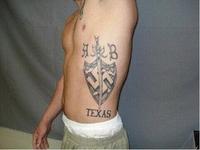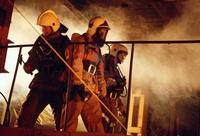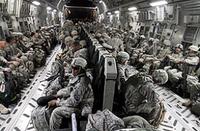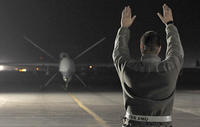-
Large robotic jellyfish to patrol the oceans

The Office of Naval Research wants to place self-powering, autonomous machines in waters for the purposes of surveillance and monitoring the environment, in addition to other uses such as studying aquatic life, mapping ocean floors, and monitoring ocean currents. Researchers have built a device for that purpose — a life-like, autonomous robotic jellyfish the size and weight of a grown man, 5 foot 7 inches in length and weighing 170 pounds.
-
-
Growing U.S. concern over North Korean miscalculation
U.S. officials are increasingly concerned with the escalating tensions on the Korean Peninsula and the risk of miscalculation. The fear is that North Korea’s young leader, Kin Jong Un, may have launched the harsh rhetorical campaign against South Korea and the United States for domestic reasons – especially the need to establish his leadership credentials in the eyes of the skeptical North Korean military – but that his youth and inexperience may lead him to over-play his hand. “He is 28, 29 years old, and he keeps going further and further out, and I don’t know if he can get himself back in,” Rep. Peter King (R-New York), former chairman of the House Homeland Security Committee, said.
-
-
Aryan Brotherhood suspected in Texas prosecutors killings

The FBI and other law enforcement agencies believe the white supremacist group the Aryan Brotherhood could be behind the murders of a Texas district attorney and his wife last weekend, and the death of an assistant district attorney earlier this year.
-
-
GAO lauds U.S. Navy's science and technology R&D
The Office of Naval Research (ONR) is the Department of the Navy’s science and technology (S&T) provider, charged with discovering, developing, and transitioning innovative S&T to meet soldier needs. Since its inception in 1946, ONR research efforts have supported the development of the laser, GPS, transistors, fiber optics, radar, cell phones, and more. A recent Government Accountability Office (GAO) report cites ONR’s Future Naval Capabilities (FNC) as an example of efficient, cost-effective program for making science and technology research functional.
-
-
Pervasive surveillance threatens privacy, gives power advantage to the watcher

Surveillance is everywhere, from street corner cameras to the subject of books and movies. A researcher says that pervasive surveillance menaces our intellectual privacy and it gives the watcher a power advantage over the watched, which can be used for blackmail, persuasion, or discrimination.
-
-
U.S. deploys F-22 stealth fighters to South Korea
As tensions on the Korean Peninsula intensify, and North Korea’s belligerent threats multiply, sources inside the administration said that the United States has deployed F-22 stealth fighter jets to South Korea to take part in large-scale military drills.
-
-
FBI wants 1994 online surveillance law updated
The FBI said the agency’s top priority this year is to update a surveillance law so authorities can monitor in real time Web activities of Americans suspected of committing crimes. The 1994 law, known as the Communications Assistance for Law Enforcement Act (CALEA), applies to telecommunication companies, but only partially to Web-based companies.
-
-
Tactile helmet helps first responders in challenging conditions

A specially-adapted “tactile helmet,” developed by researchers at the University of Sheffield, could provide fire-fighters operating in challenging conditions with vital clues about their surroundings. The helmet is fitted with a number of ultrasound sensors which are used to detect the distances between the helmet and nearby walls or other obstacles.
-
-
Cost to U.S. of Iraq, Afghanistan wars to exceed $4 trillion

A new study from Harvard University, calculating the cost to the United States of the wars in Iraq Afghanistan, has concluded that that cost will come to between $4 trillion to $6 trillion. This cost includes the spending on medical care for wounded soldiers and repairs to and replacement of military gear used in the two wars. The decision by the Bush administration to pay for the wars with borrowed money has increased their costs, the study says. In all, the two wars have added $2 trillion to the U.S. debt, accounting for about 20 percent of the debt incurred from 2001 to 2012.
-
-
A more powerful terahertz imaging system developed
Low-energy terahertz radiation could potentially enable doctors to see deep into tissues without the damaging effects of X-rays, or allow security guards to identify chemicals in a package without opening it. An electrical engineering research team has developed a laser-powered terahertz source and detector system which transmits with fifty times more power and receives with thirty times more sensitivity than existing technologies. This offers 1,500 times more powerful systems for imaging and sensing applications.
-
-
Debate in California over reward money for killer’s finders
Several donors in California have pulled back their portion of a $1 million reward which was offered for information leading to the capture and conviction of Christopher Dorner, who went on a 10-day shooting spree and killed four people, including Riverside police officer Michael Crain, earlier this year. The donors who pulled back their pledges say the criterion for the reward has not been met because Dorner killed himself. Those donors who have decided to pay up say it would be disingenuous not to honor the reward pledge.
-
-
Suppressing naturally occurring blazes increases wildfire risk

According to the National Interagency Fire Center, 9.3 million U.S. acres burned in wildfires in 2012 compared with 3.57 million acres affected in 2001 and 2.95 million in 1991. One reason for the increase in the number of acres consumed by wildfires is the U.S. government’s policy of suppressing of naturally occurring blazes. Researchers say that this policy can have unintended consequences, including making wildfires more severe.
-
-
British public divided on merits of drone strikes

Fifty-five percent of the British public would support the U.K. government assisting in a drone missile strike to kill a known terrorist overseas, but support drops substantially if innocent casualties are likely, according to a new study.
-
-
DHS agent charged with sharing child porn
A DHS agent was charged and arraigned in San Francisco on Tuesday for possessing child pornography. The large number of material prompted DHS Security to launch a lengthy investigation.
-
-
Automakers help Detroit emergency services
General Motors, Ford Motors, and the Chrysler Group joined Blue Cross Blue Shield of Michigan, Quicken Loans, and several other businesses in the Detroit area to donate $8 million for new ambulances and police cars, on the same day that emergency manager Kevyn Orr started his job.
-
More headlines
The long view
Why Ukraine’s AI Drones Aren’t a Breakthrough Yet
Machine vision, a form of AI, allows drones to identify and strike targets autonomously. The drones can’t be jammed, and they don’t need continuous monitoring by operators. Despite early hopes, the technology has not yet become a game-changing feature of Ukraine’s battlefield drones. But its time will come.
